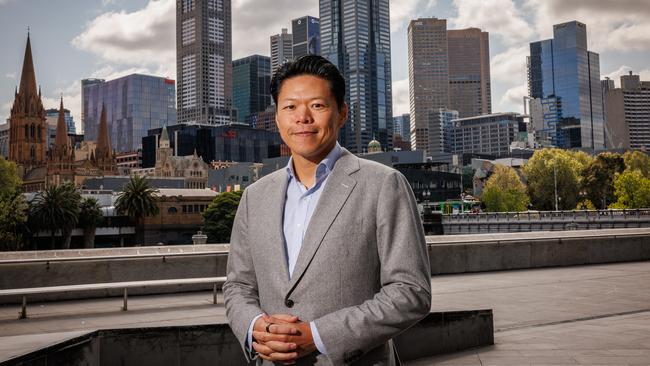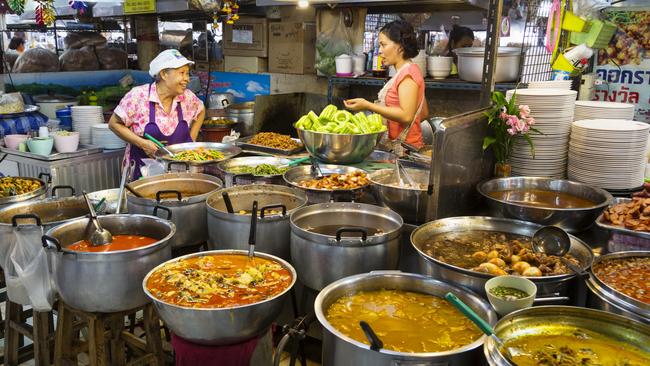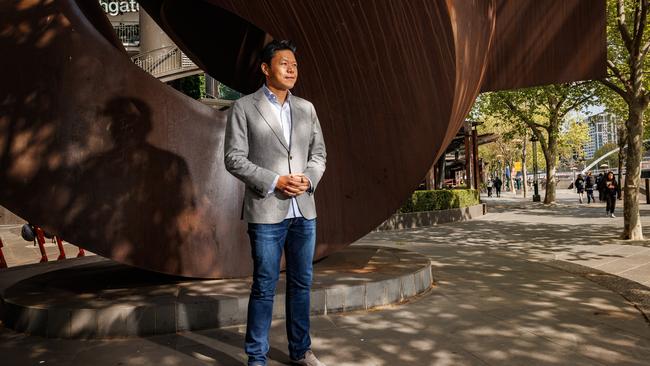Australian food on menu for Proterra’s Asian private equity specialist Tai Lin
Born into poverty in Taiwan and educated in Austria, former investment banker Tai Lin is on a mission to feed Asia’s millions safely.

Tai Lin was 30 years old when he landed in New York in 2006 to chase the opportunity of a lifetime.
He was about to play in what he terms the “premier league” of his then chosen profession – investment banking – after working in London and Hong Kong on a string of cross-border deals.
“I remember arriving at the 11th floor of the Credit Suisse First Boston offices on Madison Avenue. I quickly told my boss ‘I can’t believe I’m here’,” Lin now recalls.
The Taiwan-born banker, whose family came out of poverty, had done all of his schooling and university studies in Europe.
“I told him ‘You don’t know my story boss, but I came from nowhere and my parents had no connections, no education, no network and no money to support me. US banks don’t recruit in Vienna. They go to Harvard. So I just can’t believe I’m here, sitting alongside your latest MBA intake from Stanford and Wharton’.”
But the veteran American banker quickly put his new recruit firmly back in his place.
“Tai, you’re wrong,” he barked back. “Almost everybody has that story, that’s why they are here. You always say your parents didn’t give you this or that. But they gave you the most important thing: They gave you the values, the ethics and the work ethic. That is almost an unfair advantage in life.”
From that moment on, until today, Lin has never spoke again about his roots. He has preferred to let his deeds do the talking.
In 2007 he quit CSFB to join a firm called Black River Asset Management, a division of American agribusiness giant Cargill, where he focused on food sector investments.

Today Black River is known as Proterra Investment Partners Asia, one of the leading private equity investors in the food sector in Asia, and Lin is its Singapore-based managing partner.
The investment landscape in the Asian food sector is changing, with the focus shifting from producing more food to ensuring food safety, and catering to individual consumer preferences for healthier produce.
In June last year Findante Partners, the funds management arm of Australian financial services giant Challenger Group, took a minority stake in Proterra’s Asian arm. It gave the latter a direct financial connection to Australia for the first time.
While Proterra has largely pursued the acquisition of business to consumer brands in various countries in the region, it is now also looking at wellness and healthy food brands.
It has just finalised its first Australian deal, buying a majority stake in a Melbourne-based healthy snack foods business called Health Lab. Lin has joined the board.
The husband and wife owners of the business were advised in the transaction by Alice Wells, owner of the boutique investment banking house Lempriere Wells, famed for selling control of Australian skincare brand Grown Alchemist to global beauty giant L’Occitane Group in 2022.
“Health Lab is the perfect mix between indulgence and health. We will try everything we can at Proterra to help it expand internationally,” Lin says, noting there are more local acquisition opportunities on Proterra’s radar.
“Australia is perfect for our strategy because it is such a highly regarded place for creating food brands and producing food in general. The Australian brand for the Asian food market is really, really strong.”
The 48-year-old Lin is now a regular visitor to our shores and keen to build Proterra’s profile in the local market.
So, nearly two decades on from that fateful conversation with his Wall Street boss, he is prepared to break the promise he made to himself that day to tell his personal story to the world for the first time.
Humble beginnings
Lin’s father grew up in poverty in the Taiwanese capital of Taipei, losing his own dad when he was just 13. He polished shoes in the street to get enough money to survive.
“He told me he experienced starvation. When he was looking for a job, actually as a dishwasher in this big hotel, the chef took him into the kitchen and my dad saw a freshly baked loaf of bread. The smell of the bread inspired this feeling of safety and survival in him, so he grew up sleeping next to old crops of bread, because that was a comfort,” Lin recalls.
Lin’s mother was adopted the moment she was born after her own mother failed to survive giving birth.

His parents met in a big hotel in the northern outskirts of Taipei, his father working as a kitchen hand and his mother as a waitress. They were soon married and had a daughter. Three years later Lin arrived. By then they had opened their own restaurant.
But terrorised by the violence and protection ransoms demanded by the street gangs of the time, they were offered a new life in Austria by the former head chef at the hotel where they met.
He had opened the first ever Chinese restaurant in Vienna, where the wages were three times what they were in Taiwan, and asked them to join him.
Lin was seven years old when the family moved to Linz, the third-largest city in Austria in the far north of the country, and opened their own restaurant there. By then, he also had a younger sister.
“We went to school and I was always the only person looking like this,” Lin says, pointing to his face.
“This was back before the Asian immigration waves into Europe. But people treated us really well. Austrian people are really nice and I would say that imprinted my life experience, which is growing up differently in an environment where I was different, yet I never thought I was different.”
After school and on weekends he worked around the clock in the family restaurant business, delivering food.
It was only into his teenage years that he experienced racism for the first time.
“To the majority of my friends, I was just Tai. But there were some who didn’t think I was like them and they let me know about it,” he says.
“But what hurt me more, to be honest, is that people were looking down on my parents. They never went to school, they didn’t speak German well, we lived in a shabby house and they had no wealth. That hurt me. I developed a hunger.”
His parents still saved every spare dollar they could to send Lin to the best school in Linz.
“The unintended consequence of that was that all my classmates were the kids of lawyers, doctors and businessmen and I would be invited to their parties and their houses, with their pools and their cars. That very quickly developed a fire in my belly, and that fire kept me going,” he says.
After leaving school, Lin was desperate to move to Vienna to study and was accepted into the Vienna University of Economics.
But his parents wanted him to stay in Linz to continue working in their business.
They compromised on their son making the two-hour trip back home from Vienna every weekend to help them.
Lin eventually graduated with a Masters degree in Business and Finance, but not before he had also served in the Royal Guard of the Austrian army under the country’s military conscription regime.
Unexpectedly, the experience gave him skills that would set him up for life.
“I just got on with the lieutenants and the officers really well, so well that they elected me to be our unit’s speaker,” he says.
“So I would be the one speaking to the officers about the conditions in the dormitory or the food. Also if anybody had a personal problem, they could come to me and speak about it. People liked speaking to me because I was tolerant and non-judgmental, because of my previous life experience. That instilled in me this confidence that I could get something done. I could achieve my goals.”
Multinationals
Lin moved to London in 2001, right after the dot.com crash, where he scored his first job in investment banking with HSBC.
There he met his wife, who is also Taiwanese. They now have two children and while they live in Singapore, at least once a year the family holidays in Austria where Lin’s parents are happily retired.
“It is really important to my wife and I that our kids hear my parents story,” Lin says. While he describes his nationality as “homeless” given his upbringing, at heart he will always be Taiwanese.

“My wife and I have a similar sort of background. We are actually proud of the fact that we are so multinational and we have wanted to give that to our kids as well. But now that we are growing a bit older, it is nice to have a root association, a country to root for,” he says.
“We visit Taiwan as a family every year because it is really important to us that our kids know where our ancestors are from.”
On the constant media speculation about the threat of a war between China and Taiwan, Lin cannot contain his frustrations about how the headlines differ from his own concept of the reality.
“I’m at lunch, I’m at dinner, I’m at a corporate meeting, and people always tell me, ‘Oh Tai, you know there’s a plan to take over Taiwan. I’ve heard it from people in the highest places.’ They know whoever who says there is going to be a war. I have never believed that there is going to be a war,” he says.
“All these people who have been telling me for 20 years that there is going to be a war, they’ve been wrong 20 times. I’m not saying the chance is zero. But a lot of the international media makes it sound like it is an 80 or 90 per cent chance. I think it’s nowhere near that.”
In fact Lin lived in Shanghai for five years working for Proterra and while investors continue to shun the Chinese economy, he says Proterra “really likes” China for food industry investment, given it is one of the least volatile, most recession-proof sectors of the economy.
He doesn’t miss his days as an investment banker.
In sharp contrast to its often crudely transactional nature and despite the same criticism being made of private equity, he describes working in the latter as “very humbling” because “in PE you actually need to live with the consequences of your decisions”.
“Almost half the time, you get it wrong,” he says.
“PE is also so much a people’s business. I thought I was good at financial modelling, analysis and transaction management, but it’s about people in the investee businesses, your own team and in the market.”
While many of his wealthy friends and associates from school and university and his peers back in New York in 2006 have taken different paths in their work and family lives, Lin wouldn’t trade places with any of them.
“Now if somebody says ‘Tai Lin’, you can immediately say I’m the guy who invests in food in Asia and I’ve been doing it for almost 18 years. I love that because it feels to me like I have a consistent strategy, a vision, a story, a mission,” he declares proudly.
“I’m not David who joined Goldman for two years, who then joined this corporate and made it to executive vice-president, who then started up his own company and that didn’t work out. Now he’s working for his family office. You are almost like ‘David who?’ What I really love about what I do is there is a tag associated it. I really stand for something.”



To join the conversation, please log in. Don't have an account? Register
Join the conversation, you are commenting as Logout